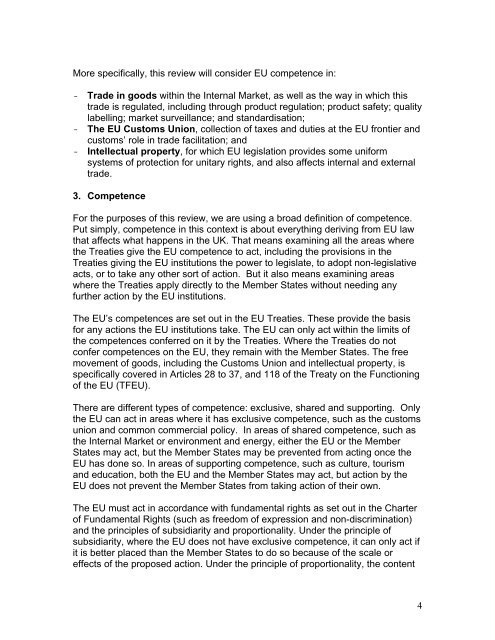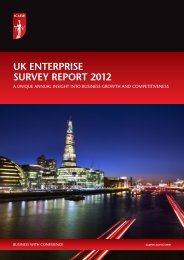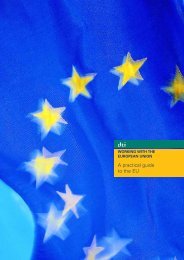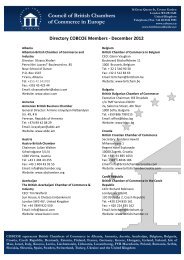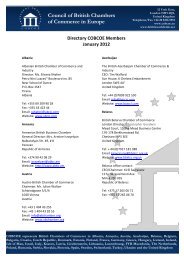Free Movement of Goods - Gov.uk
Free Movement of Goods - Gov.uk
Free Movement of Goods - Gov.uk
Create successful ePaper yourself
Turn your PDF publications into a flip-book with our unique Google optimized e-Paper software.
More specifically, this review will consider EU competence in:- Trade in goods within the Internal Market, as well as the way in which thistrade is regulated, including through product regulation; product safety; qualitylabelling; market surveillance; and standardisation;- The EU Customs Union, collection <strong>of</strong> taxes and duties at the EU frontier andcustoms’ role in trade facilitation; and- Intellectual property, for which EU legislation provides some uniformsystems <strong>of</strong> protection for unitary rights, and also affects internal and externaltrade.3. CompetenceFor the purposes <strong>of</strong> this review, we are using a broad definition <strong>of</strong> competence.Put simply, competence in this context is about everything deriving from EU lawthat affects what happens in the UK. That means examining all the areas wherethe Treaties give the EU competence to act, including the provisions in theTreaties giving the EU institutions the power to legislate, to adopt non-legislativeacts, or to take any other sort <strong>of</strong> action. But it also means examining areaswhere the Treaties apply directly to the Member States without needing anyfurther action by the EU institutions.The EU’s competences are set out in the EU Treaties. These provide the basisfor any actions the EU institutions take. The EU can only act within the limits <strong>of</strong>the competences conferred on it by the Treaties. Where the Treaties do notconfer competences on the EU, they remain with the Member States. The freemovement <strong>of</strong> goods, including the Customs Union and intellectual property, isspecifically covered in Articles 28 to 37, and 118 <strong>of</strong> the Treaty on the Functioning<strong>of</strong> the EU (TFEU).There are different types <strong>of</strong> competence: exclusive, shared and supporting. Onlythe EU can act in areas where it has exclusive competence, such as the customsunion and common commercial policy. In areas <strong>of</strong> shared competence, such asthe Internal Market or environment and energy, either the EU or the MemberStates may act, but the Member States may be prevented from acting once theEU has done so. In areas <strong>of</strong> supporting competence, such as culture, tourismand education, both the EU and the Member States may act, but action by theEU does not prevent the Member States from taking action <strong>of</strong> their own.The EU must act in accordance with fundamental rights as set out in the Charter<strong>of</strong> Fundamental Rights (such as freedom <strong>of</strong> expression and non-discrimination)and the principles <strong>of</strong> subsidiarity and proportionality. Under the principle <strong>of</strong>subsidiarity, where the EU does not have exclusive competence, it can only act ifit is better placed than the Member States to do so because <strong>of</strong> the scale oreffects <strong>of</strong> the proposed action. Under the principle <strong>of</strong> proportionality, the content4


